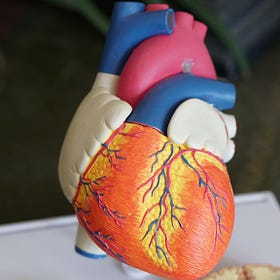10 Nutrients That Support A Healthy Heart
Did you know that supporting immune system function can also be beneficial for supporting heart health?
Supporting cardiovascular health is not an easy thing to do. We eat food. We exercise. We get stressed by work. We sleep. All these actions do contribute to the overall state of our immune system.
As a result, if we ever do encounter situations such as high blood cholesterol in our middle age years (or later), we freeze. We don’t really know what to do. High blood cholesterol is a problem that has almost no symptoms involved, and therefore we tend to be unaware of what is really going on in our bodies then.
However, cholesterol issues tend to precipitate further issues down the line with atherosclerosis and heart disease, which can make it scary and unnerving for some people. The common thought is “I’m eating less seafood and fatty foods and eggs, but why are my cholesterol levels still so high?” That’s one of the myths about cholesterol that I do discuss here:
It Isn't Really Just The Cholesterol That Contributes To Heart Disease.
The cholesterol molecule is something that we have a problem with.
But what’s so bad about cholesterol accumulation in our bodies, if the doctors do tell us that it’s bad? It starts off with the accumulated cholesterol generating oxidative stress from within the body, as I discuss here:
The Problem With Cholesterol Accumulation In Our Body.
This piece is a continuation from It Ain’t Really Just The Cholesterol That Contributes To Heart Disease:
I also do highlight the mechanisms behind cholesterol accumulation in the blood here:
Now, Seriously, What's So Tricky About Cholesterol?
This article is the final part of a 3 part miniseries. The first 2 parts can be found at:
We examine the activity of the immune system in atherosclerotic plaque formation and subsequent plaque ruptures, which then form the basis for the development of a heart attack or stroke.
Hidden deep within the symptom of heart disease are the twin pillars of oxidative stress and mild chronic inflammation. As inflammation is an immune system signalling response, any attempts to improve one’s diet ought to be increasing the consumption of nutrients that can help support a healthy immune system function.
Bearing that in mind, there will be some nutrients that support both the immune system and heart health simultaneously. You’d be looking at a higher level of defensive protection from viral infections and a healthier heart with a reduced chance of developing heart disease.
So, why not? Here are 10 nutrients that help to support a healthy heart. Do bear in mind that this list is not exhaustive, and neither does it guarantee that one will have zero chance of getting a heart attack. The risk is reduced, but it is not fully reduced to zero.
There are at least 4 nutrients that support the function of the nuclear respiratory factor 2 (nrf2) pathway in the body, which stimulates the cells in our body to produce glutathione from within the cell. Glutathione acts as an antioxidant to protect the body from oxidative stress. Nutrients in this list include resveratrol, curcumin, epigallocatechin gallate (EGCG) and quercetin.
Omega-3 fatty acids, namely eicospentanoic acid (EPA) and docosahexanoic acid (DHA) aid in reducing the activity of the pro-inflammatory nuclear factor kappa B (NF-κB) pathway. NF-κB is the major pathway that regulates the intensity of the inflammation signal in the body. The nrf2 pathway helps to balance out any overshoot that is coming from NF-κB, and these two pathways are in a constant tug-of-war battle for maintaining the inflammatory signal. DHA and EPA can also contribute to the synthesis of anti-inflammatory mediators such as Resolvin D1 that enhances cell phagocytosis and aid in anti-inflammatory signalling.
Proanthocyanidins help to maintain the elasticity of blood vessels (vascular elasticity) and as a scavenger of reactive oxygen species (ROS). Vascular elasticity is one of the important parameters when considering the likelihood of cardiovascular disease development in a person.
Magnesium and calcium function in tandem. The heart is a muscle, and the heart muscle functions on the basis of a rhythmic contraction and relaxation. Calcium provides the contraction signalling, while magnesium signals relaxation. Hence they function in tandem and their consumption should also be in a balanced ratio for optimal contraction and relaxation rhythms.
Coenzyme Q10, which facilitates electron transport in the cellular process of generating energy. Sufficient levels of CoQ10 in the cell will aid the transport of these electrons and reduce the formation of ROS that would otherwise upregulate NF-κB activity.
As I have mentioned, cholesterol accumulation can be a result of suboptimal bowel movements. As a result, soluble fibre is recommended by the United States Food and Drug Administration (US FDA) for the treatment of high blood cholesterol.
Supplementation might be a useful tool to use as a cheat code to provide nutritional support; however, one does have to know the criteria for choosing a good brand, which I outline in this article: Dietary Supplements- How Does One Choose A Good Brand for Consumption?
Do have a look at Dr J’s recommendations - a list of supplements from the brand that I prefer to support heart health, which I do know meets the criteria set out in the article that I have mentioned.
Disclaimer: This link is an affiliate link. I may receive commissions for any purchases made via this link.








Dear Dr Yong, Thank you for your efforts to educate us. I am a 75 y/o youngster engaged in a combo Blue Zones (the zen of living) and an extensively modified David Sinclair program. A few observations: Taking calcium seems to encourage arterial calcification; I get mine through milk products (low fat Mozarella), vitamin D3 should ALWAYS be taken with K2 as the latter directs the calcium to the bones. As for fish oil, the Standard American Diet (aptly named SAD) is lunatic when it comes to oil. We have bought the myth that exogenous Cholesterol raises our heart disease risk. We should be stressing avocados, olive oil and some say coconut and peanut oil. Our diet as a nation is terribly unbalanced and along with excess calories (which promotes early disease), we eat the type of food that capitalist food designers have made for us, without regard to our health. Peter H. Dohan MD